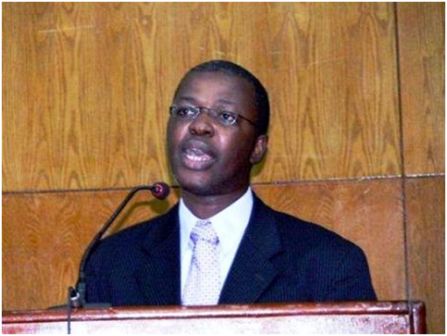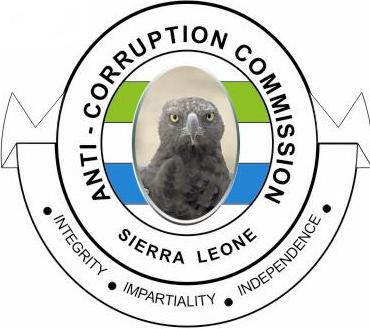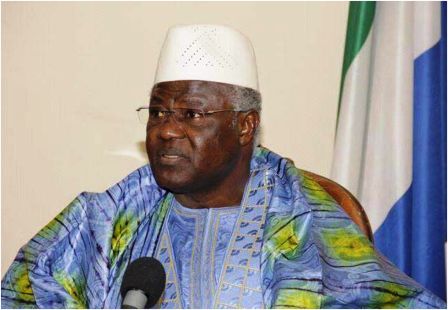OSIWA’s partnership with Integrity Nigeria yields new tool to combat corruption in West Africa
The Open Society Initiative of West Africa (OSIWA) say its strategy to develop and implement strong governance institutions, processes and structures that are transparent, accountable, intolerant of impunity and provide robust protection of fundamental rights to citizens of West Africa is gaining ground. (Photo: Abdul Tejan-Cole – Executive Director of OSIWA)
Abdul Tejan-Cole is Executive Director of OSIWA and former Commissioner of the Anti-Corruption Commission Radio aired Sunday on WRSU, 88.7 FM at Rutgers University in New Brunswick, New Jersey, in Sierra Leone. During a broadcast interview on African New Dawn USA he told reporter Dennis Kabatto about OSIWA’s challenges to rebuild good governance, reestablish the rule of law, recent partnership with Integrity Nigeria – an anti-corruption, research and advocacy group – and their new tool to combat corruption to its barest minimum in West Africa. A complete transcript of the interview follows.
We want to talk to you about your organization’s political, economical governance, law, justice and human rights programs in West Africa. But first let us start with Integrity Nigeria and their new tool to combat corruption. What is Integrity Nigeria?
Integrity Nigeria is one of the leading groups in Nigeria that has been waging war against corruption in Nigeria. It’s headed by a very prominent Nigerian advocate Olusoji Apampa and he has been pioneering anti-corruption work in West Africa for the past two or so decades. What they are doing in Nigeria now is not new; it is something which is been tried and tested in India before. A similar project was hosted in India called “I Paid a Bribe” project and what Integrity Nigeria is doing is replicating that project in Nigeria. What the platform does is it provides a space whereby people who have been asked to pay a bribe can anonymously go online and be able to state who asked them for a bribe, when they were asked to pay a bribe and by whom? So thereby naming and shaming those who are continuously harassing people and asking them for bribes in Nigeria. And it is also providing an opportunity for the anti-corruption authorities in Nigeria to have adequate information as to who are those that they should be targeting in their fight against graft in Nigeria?
What is the relationship between Integrity Nigeria and OSIWA?
They are really our partners on the ground as you know OSIWA provides grants to a number of organizations within West Africa and Integrity Nigeria is one of the organizations – we have provided a small grant for Nigeria but we don’t see them really as grantees we see them as partners because we’re working together with them to ensure that together we fight corruption in Nigeria and West Africa as a whole
And, how is this new project coming along? How successful is it?
The website was just recently been launched so it is still early days at the moment. So we are hoping that we would launch an public information campaign to educate people about it so that people are aware of it and people would use it. And, we hope if we get enough people to use it, it would create the necessary attention that’s needed in Nigeria for the officials to take plight against corruption much, much more seriously
If the project is successful in Nigeria, are there any plans to replicate it in other parts of West Africa, for example in Sierra Leone?
Yes, the plan definitely is to use Nigeria as a pilot and if successful in Nigeria we would definitely use it in the 9 other countries in which OSIWA works one of them is Sierra Leone, Liberia, Ghana as well as Senegal, Guinea, Cote D’Ivoire and Benin.
OSIWA also has 3 programs in West Africa and you as executive director – first of all where are you based? Where is your office?
The headquarters are based in Senegal in Dakar but we do have offices in Nigeria, Sierra Leone, in Liberia as well as in Guinea – Conakry
Tell us more about your political governance project that you are implementing in West Africa?
What we do in OSIWA by and large is to try to create open societies in West Africa, creating an open space for political dialogue, creating an open space for the governed to interact with those in government. And, so our political governance unit focuses more in terms of ensuring that there is that conversation going on between those in government and those who are being governed ensuring that the needs of those being governed are reflected in the policies of the government. We push for a number of things primarily free and fair elections and one of our model projects has been what we call the election situation room which brings civil society groups together to work with electoral commissions and a number of government bodies to ensure that there are free and fair elections across the continent. And in Nigeria, Liberia and recently in Sierra Leone and Senegal we’ve been able to work with the electoral government to ensure that the elections that have been held in the respective countries have been by and large seen as free and fair. We’ve also supported work that ECOWAS has done in setting up the ECOWAS network of electoral commissioners that brings all the electoral commissioners from the various countries in West Africa together so that they can share experiences learn from one another the best practices and see how best they can ensure that the credibility of the elections in West Africa have improved.
Talk about the challenges your organization have faced trying to rebuild governance and reestablish the rule of law in West Africa?
I mean, there are huge challenges fighting for open societies in West Africa, there are lot of challenges, the problems are huge in terms of policies of the governments, not all government are receptive to the whole concept of open societies. Although we have made significant progress in the past couple of years there is still some government that are not keen to the whole idea of democracy we still have a huge challenges in ‘West Africa for example the Gambia where President Yahya Jammeh continues to move against the trend in the sub region. So there is still those who do not believe in the whole concept of democracy and good governance and we continue to work to build not only the capacity of civil society but other active players in those countries so that they can be able to change the tide and ensure that we move towards a democratic and good governance ways.
Recently, there were presidential and parliamentary elections in Ghana and Sierra Leone. Did your organization monitor those elections?
We did not monitor the elections directly ourselves but we supported organizations that did so we funded the local group in Sierra Leone called NEW – the National Elections Watch that sent local observers to monitor the elections across Sierra Leone. Similarly, in Ghana we worked CDD Ghana to ensure that they also put local monitors – so we are empowering local actors so that the local actors can monitor the elections and ensure that they are credible
Also, recently in the news a Senegalese man set himself on fire and died, I think right in front of the presidential palace. Local media quoted him as telling witnesses that life was far better under former president Mr Abdoulaye Wade. What is the economic situation in Senegal?
The economic situation continues to be relatively difficult, I mean, there are even in the past couple of days allegations against former President Wade involving misappropriation of huge amount of monies.
And, I think Senegal is going through a relatively difficult period and there is a real need for the new government in Senegal to address some of the economic challenges. This is why the work that we have been doing in West Africa has been complimented by the establishment by Open Society of a new center to work on economic policy, to work with government on advising them on economic policy so that they could come up with strong economic policies that can address the needs of the people. We are getting a lot of information from the World Bank, the IMF about very good financial figures and very good economic figures across Africa but yet still, the reality on the ground is that the average man still continues to feel the economic pinch. And so we continue to work within our economic governance and within a number of other organizations within West Africa to try to ensure that our governments implement the right economic policies and to alleviate the plight of the common people within our respective countries.
And, finally in the area of law, justice, human rights and in the area of corruption though corruption is a worldwide problem it is becoming rampant in Africa, West Africa including Sierra Leone and you yourself was a former anti-corruption commissioner in Sierra Leone. Reflecting back on your work and the state of affairs in Sierra Leone what would you say is happening with corruption in Sierra Leone since you left?
I think what we have been able to achieve is that we have been able to raise the bar. We now have not only in Sierra Leone but in a number of West African countries a very good legal framework, we now have the foundation, we now have the necessary laws in place. Most of our countries have ratified the UN convention against corruption, most countries have also ratified the African Union convention. There is still a lot of work that needs to be done with the ECOWAS protocol on corruption but I think we are laying the foundation and I think for many people the expectations that things would happen overnight, we have to realize that sometimes these things would take time. So my sense is that I think we are making positive moves, I think we are moving in the right direction. I think a lot more needs to be done in particularly in terms of making the fight against corruption the people’s fight, getting public support for the fight against corruption, getting people much more engaged in the fight against corruption. What we are doing with Integrity Nigeria is to get local citizens, local people actively engaged in that fight with the new platform. And so what we need to do across West Africa and what we continuously need to do is continue to engage young, local people so that they can be part and parcel of the fight it is the people’s fight and I think without getting people’s support and people’s participation in the fight against corruption the fight would not succeed. And, so this is why it is important that we continue to stress that despite the good laws, despite the framework that we have in place I think it is important that we get people involved in the fight and get people to be much more aware of what’s going on and how they can contribute towards fighting corruption in their respective countries.
By Dennis Kabatto
Stay with Sierra Express Media, for your trusted place in news!
© 2013, https:. All rights reserved.





